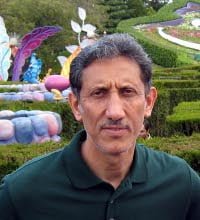
Taleb Al-Refai
- Kuwait
- Zu Gast beim ilb: 2009
Taleb Al-Refai was born in Kuwait in 1958. He studied engineering science at university in his home town. He began writing short stories while a student in the 1970s, publishing them in Kuwaiti newspapers. Later, his literary essays, columns and short stories appeared in various Arabic-language magazines and newspapers. Up until the mid-1990s Al-Refai worked mainly as an engineer before moving to the National Council for Culture, Art, and Literature.
Taleb Al-Refai has published six collections of short stories, three novels, one play and several literary studies.
Al-Refai became known to a wider Arab readership through his socially-critical novel »Zill asch-schams« (1998, tr: The Shadow of the Sun). In the novel he deals with a theme which is not often dealt with in Arab literature: the fate of immigrant guest workers. Hilmi, an Egyptian teacher, like many of his compatriots flees from the poverty of his homeland in search of riches of the wealthy Gulf States. He is soon confronted by the bitter reality of life in Kuwait. His wages are barely enough cover his living costs, support his family in Egypt, and pay off his debt for his passage to the promised land. It is impossible for him to return to Egypt, as he is scared of appearing to be a loser to his wife and parents. Hilmi keeps his head above water by giving private lessons and then falls in love with one of his pupils, a young Kuwaiti girl from a wealthy family. The relationship is made public and the Egyptian teacher is accused of rape and sentenced to fifteen years in prison.
In his subsequent novels Taleb Al-Refai remains critical of Kuwaiti society. In »Ra´ihat al-bahr« (2002, tr: The Scent of the Sea), for which he won the Kuwaiti State Prize for Literature, he tackles a few thorny issues: sexual abuse in the family, the oppression of women, and extra-marital affairs. Central to the novel are Hamad and Sarah, who meet and fall in love at university. Past events place a burden on their relationship and are passed from the parents’ generation to the children. The novel culminates in an explosion of violence. The suffering seems to continue. The critic Rasim al-Madhun wrote of the novel in the interregional Arabic-language newspaper »ash-Sharq al-Awsat«: »Taleb Al-Refai succeeds in tearing the mask from the face of Arab society, revealing the tragedy which dominates the fates of younger generations.«
Taleb Al-Refai lives in Kuwait.
© international literaturefestival berlin
Mirat al-ghabash
Dar al-Mada,
Damaskus, 1997
Zill asch-schams
Dar Sharqiyat
Kairo, 1998
Hakaya ramliya
Dar al-Mada,
Damaskus, 1999
Ra’ihat al-bahr
Dar al-Mada
Damaskus, 2002
